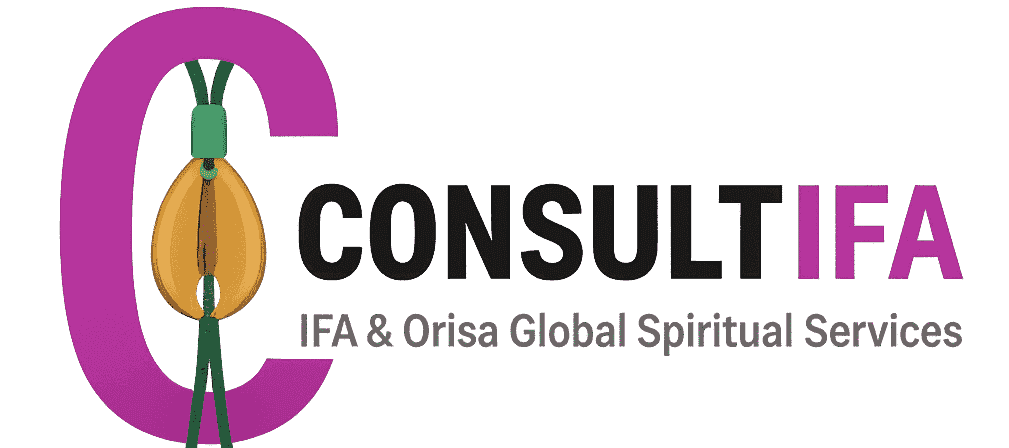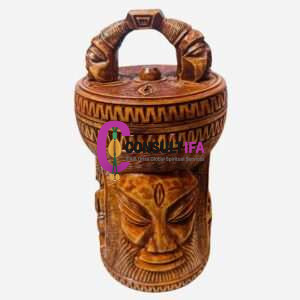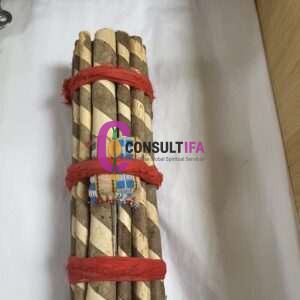THE IFA BABALAWO (PRIEST)
The Babalawo, a well trained priest and the client has a very important relationship, akin to a Doctor and his patient.
In his role of diviner and priest, he must be competent. Well trained enough to consult through the Oracle of Ifa the clients problem, which he will receive in a binary coded language called Odu, through the application of the Oracle he uses.
The Odu will appear, and he must thereafter find out its orientation, whether it came in Ire (positive) or (Ibi) negative.
In plain language (breaking it down in my way), he opens up (by casting the Oracle) her destiny book, which resides within space and time. In the moment as she sits before him, a page of her book (destiny or life’s journey) is brought forward and drops before him, but is coded so that only HE, who is properly trained, can interpret it and tell whether it brought with it good (Ire) or bad news (Ibi), all this is energy and the manipulation of energy.
Upon arrival the Odu (live energy) which is now before the client and the diviner, will be chanted through a series of chants/songs, ese Ifa (verses of Ifa, pertaining to this particular Odu, each Odu when it drops is venerated this way). The Babalawo must now at this point be skilled enough to know which story/verse of this particular Odu that is present, pertains to the client and his or her problem, as there are over 4, 000 verses to each Odu. He must know through what sits before him and also his knowledge and training, what pertains to the client, as he chants Ifa verses. He will begin to tell her what the Ifa says, and will ultimately see a solution, which will be sacrifice.
We will write on sacrifice and its importance very soon, as this tradition is a tradition of sacrifice. The giving over of one thing to receive another.
Of all the divination systems, those that uses an Oracle, Ifa divination is the most reliable. The Client sits, assured within his or herself that whatever ails her or him, the solution lays within the divination process, because what was now shrouded in darkness, will be brought forth into light.
Below is a paper from the University of Ilorin, Ilorin Nigeria that was shared with me. I just shared a small piece of the paper, the part which explains the Divination Process and the Client.
THE IFA DIVINATION PROCESS
University of Ilorin, Ilorin, Nigeria
- Introduction
Divination is universally concerned with practical problems and it seeks information from which practical decisions may be made. The source of such information is not conceived as mundane.
The divinatory arts are many and a broad understanding of them can only emerge from a survey of actual practices in various cultural settings.
Men all over the world practise divination and device various methods of doing this. The Assyro-Babylonians have their Bam (seer and diviner) who employs hapatoacopy-divination by observing the liver of sheep which had been used for sacrifice. The Buddhists in India practise astrology and they use lots and oracles as means of divination.
The Greeks had their oracular shrinks of Jupiter at Dodona and Apollo at Delphi. The Romans used the Sortes and the Japanese use Ornoplatoscopy. In Rornan society, auspices (auspicia) are the means by which the Romans seek to ascertain the support of the gods.
Other forms of divination are palmistry, cream interpretation and astrology. Diviners of similar kinds include the many types of media who may communicate with the dead (necromancy process) as well as-crystal gazers, dream interpreters and diviners by automatic writing.
Like the other peoples of the world, the Yoruba employ various system These systems include erindinlogun which involves the casting of sixtecn cowries, which employs a set of separate strings with four markers each and iyanrin tite (sand and cutting). Others areobi dida (casting of kolanut), omi wiwo(water gazing), owo wiwo (paImistry), owo wiwo (gazing on money), atipa or abokuusoro (necromancy) and wjwo oju (gazing on the eyes). One of our informants, Awoyerai Elebu-ibon, emphasises that get (three cowries),’ eerin (four cowries) and eejo (eight cowries) were used for divination in the distant past. Among others, Ogimbiyii (1952: 83-84) Awolalu (1.979: 121), Bascorn ((1969:11) and Qlatunji (1984: 109) have-described some of the processes and forms divination among the- Yoruba.
Of all the methods of divination employed by the Yoruba, Ifa divination is considered the most reliable, and the most popular means of divination (Bascom 1969:11 and Awolalu 1979: 122). Till these day, the Ifa priests are located over the Yorubaland. As this research reveal most of the various forms of divination among the Yoruba take their.sources from Ifa divinatioin .
Ifa divination is both a body of knowledge and a system of social, emotional, pathological control, employing relevant historical and mythological precedents contained in the special divinatory verses to be recited, chanted or song by the babalawo. lfa divination is the most complex system of divination both in its repertoire of verses and in its range of applications. To the Yoruba, divination or consultation with the supreme divinity (Orunmila) is of crucial spiritual importance.
The oral tradition emphasises the part it played by Orunmila is guiding the destiny of man and divinities. One reason given for his intimate knowledge of matters affecting man’s destiny is that Orunmila is present when man is being created. Therefore he knows all the secrets of human beings and thus he can reveal what one has destined and if the destiny is an unfortunate one, Orunmila can prescribe remedies to avert the misfortune.
This is why Orunmila is being described as Elerii-ipin (the witness of destiny or lot), ‘Obirikiti A-pa-ojo-iku-da’ (the great one, who alters the date of death).
If a divination is operated by means of the configuration called Qdu. In the Ifa corpus are as many as 256 possibilities (16 principal and 240 minor Odu) each containing mythological stories which the babalawo narrates in the process of divination. The sixteen principal Qdu (plus the signs) in order of seniority are listed below (for easy reference).
| ODI MEJI [4] | IWORI MEJI [3] | OYEKU MEJI [2] | E.JI OGBE[1] |
| 0 000 00 00 00 0 0 | 00 000 0 0 0 00 00 | 00 0000 00 00 00 00 00 | 0 00 0 0 0 0 0 |
| OKANRAN MEJI [8] | OBARA MEJI [7] | OWORI MEJI [6] | IROSUN MEJI [5] |
| 00 0000 00 00 00 0 0 | 0 000 00 00 00 00 00 | 00 0000 00 0 0 0 0 | 0 00 0 00 00 00 00 |
| OTURUPQN. MEJI[12] | IKA MEJI[11] | OSA M EJI [10] | OGUNDA MEJI [9] |
| 00 0000 00 0 0 00 00 | 00 000 0 00 00 00 00 | 00 000 0 0 0 0 0 | 0 00 0 0 0 00 00 |
| OFUN MEJI[16] | OSE MEJI [15] | IRETE MEJI[14] | OTUA MEJI [13] |
| 00 000 0 00 00 0 0 | 0 000 00 0 0 00 00 | 0 00 0 00 00 0 0 | 0 000 00 0 0 0 0 |
Note: The numbering order (1-16) follows the system in which the Qdu signs are always marked by the babalawo.
The Client:
The term client, in this study, refers to the person who consults a babalawo for advice and guidance by means of divination. Before a client consults a babalawo, he/she should share the belief in the institution of traditional, divination because the factor of faith plays an important role in a positive outcome of the practice.
Whatever his social status, religious inclination, age or educational attainment, a client must submit himself to the authority and direction of the babalawo .
This is because the babalawo is believed to be endowed with the knowledge to solve the client’s problem . And as the most trusted diviner, the babalawo too does his best to fulfil the obligation.
To the Yoruba, consultation with the supreme divinity ( Orunmila )is of crucial spiritual importance when one is about to choose a wife, when a. child is born, when one intends to build a house or when one plans a journey or undertakes any project with chances of profit or loss. He “believes that by following the set rules of the system, he can achieve a direct contact with Orunmila the wisest divinity and the most trusted member of the pantheon.
It is interesting to find in the existing works and fresh data collected on Ifa literary corpus that Orunmila himself, the Odu, the divinities as well as animals and inanimate objects had once been clients. They consulted Ifa oracle for various reasons, lack of money, children, wives, or for :victory over enemies. Foe example, Orunmila consulted other babalawo when he had no money, to buy food for his visitors as shown in the excerpt below:
Oda-owo, awokoro, Qda-owo, Ifa priest of koro,
Aabo, obinrin re, Aabo, his wife,
Omo won oke Ijerot Their child in the city of ljero,
Bi oda owo ti n dami, Just as.lack money,
Bee ni aabo mi n bo mi, I also have security,
A dia fun Orunmila, Performed Ifa divination for Orunmila,
Nijo ti aalejo meta, On the day three strangers,
O wo sile baba, Were to lodge in the father’s house,
Ifa o si nii ni ookan, And Ifa did not have any cowry (money),
A a yoo na(Abimbola 1968: 25-26). Which he could spend.
Another event is when the babalawo divined for Eji-Obara, one of the sixteen principal Odu. Poverty was the cause of his consultation. Here is the ese lfa
Ise o sohun amusere; Poverty is not a thing to play with;
Lya o sohun.amusawada;. Suffering is not a thing to jest with;
A.dia fun Eji-Obara; Divined for Eji-Obara
Ti n hagbon ola, Who is weaving baskets to be wealthy,
Ti gbogbo aye n tin And everybody is laughing at him.
In the data below, inanimate objects (some drinks) appear as the clients.
Iwo lo se e It is you who offends,
Mee ba o wi That l blame you,
Oran isiin won o toja, Matters of nowadays should pot cause a quarrel,
Ija naa lo de lorin dowe, It is the quarrel which makes a song sound proverbial,
A dia fo ti Performed Ifa divination for Oti (wine).
Qmoo won lode Ilare Their offspring ax Hare
Iwo lo se e It is you who offends,
Mee ba o wi, That I blame you,
Oran isiin won o toja Matters of nowadays should not cause a quarrel,
Ija naa lo de lorin dowe It is the quarrel which makes a song sounds proverbial, Adifa fun Ogoro, Performed Ifa divination for Ogoro (date palm-wine) Tii somoo won lode lode, Who is their offspring at Bode
Iwo lo se, It is you who offends,
Ti mee ba o wi That I blame you,
Oran isiin won o toja, Matters of nowadays should not cause a quarrel,
Ija naalo de lorin dowe, It is the quarrel which makes a song sound proverbial,
Difa fun omi tutu, Performed Ifa divination for omitutu (cold water),
Omoo won ode Otun Moba Their offspring at Otun ‘Moba
‘(Irosungbemi) (a minor odu)
There is need to discuss further the-relationship between the diviner and the client. In most cases , the diviner is an authority and the most active participant in the course of Ifa divination.
He (the babalawo) casts the divining chain or operates the sacred palm nuts and when an Odu emerges, he interprets and narrates the relevant stories and prescribes sacrifices. All along the client remains passive and listens attentively to the divine message.
However, he may briefly react to the general findings of the diviner, whether what he (the clients) has in mind has been touched or not. After the performance of any prescribed sacrifice, the client has emotional relief and psychological satisfaction.
Orí igi tó wọ́ làá wà táà rí èyí tó tọ́ /
It’s while on the crooked tree that one will find the proper one…..Yoruba Proverb!
[Make the best of where you are and what you have.]





